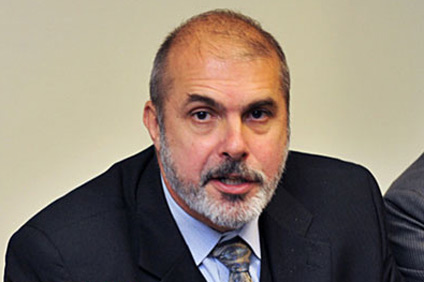EU affirms support for Azerbaijan's integrity, peaceful Nagorno-Karabakh settlement

By Sara Rajabova
The territorial integrity of each country, including Azerbaijan, is inviolable, European Union Special Representative for the South Caucasus Philippe Lefort said in a meeting with the chairman of the Azerbaijani community of Nagorno-Karabakh Bayram Safarov on June 18.
During the meeting, Lefort noted that the Armenia-Azerbaijan Nagorno-Karabakh conflict is a very important issue for the EU and the organization respects the territorial integrity of Azerbaijan.
Lefort also said the EU stands for a peaceful settlement of the conflict as soon as possible and it is very important to continue talks on the issue.
Safarov, for his part, said the organizations which should display decisiveness in the conflict resolution continue to take a position based on double standards. He noted that the Nagorno-Karabakh conflict must be resolved in accordance with the principles of international law while ensuring Azerbaijan's territorial integrity.
Safarov underlined that in this regard the Azerbaijani side expects a decisive position from the EU as well as other international organizations.
A delegation led by the EU special envoy for the South Caucasus started a visit to Azerbaijan last week.
In Lefort's meeting with Azerbaijani President Ilham Aliyev on June 12, the parties discussed the development of cooperation between Azerbaijan and the EU, as well as the current state of and prospects for the talks to settle the Nagorno-Karabakh conflict.
On the same day, Foreign Minister Elmar Mammadyarov received the delegation led by Lefort. During the talks Lefort briefed the minister on his recent visit to the South Caucasus and said he held prolific meetings with officials. He added that the EU is interested in the development and stability of the region and expressed the bloc's readiness to render full support for this purpose.
The Azerbaijani Foreign Minister spoke about the current state of peace talks aimed at a settlement of the conflict between Armenia and Azerbaijan and shared his views on a just solution of the long-standing dispute.
Mammadyarov and Lefort also exchanged views over the contribution that the settlement of the conflict could make to regional development.
The Nagorno-Karabakh conflict emerged in 1988 when Armenia made territorial claims against Azerbaijan, its South Caucasus neighbor. The two countries fought a lengthy war that ended with the signing of a fragile ceasefire in 1994. Armenian armed forces have since occupied over 20 percent of Azerbaijan's internationally recognized territory, including Nagorno-Karabakh and seven adjacent regions. Armenia has not yet implemented the U.N. Security Council's four resolutions on a pullout from the occupied territories.
Russia, France and the U.S. have long been working to broker a solution of the Nagorno-Karabakh conflict through the OSCE Minsk Group, but their efforts have been largely fruitless so far.
Here we are to serve you with news right now. It does not cost much, but worth your attention.
Choose to support open, independent, quality journalism and subscribe on a monthly basis.
By subscribing to our online newspaper, you can have full digital access to all news, analysis, and much more.
You can also follow AzerNEWS on Twitter @AzerNewsAz or Facebook @AzerNewsNewspaper
Thank you!
